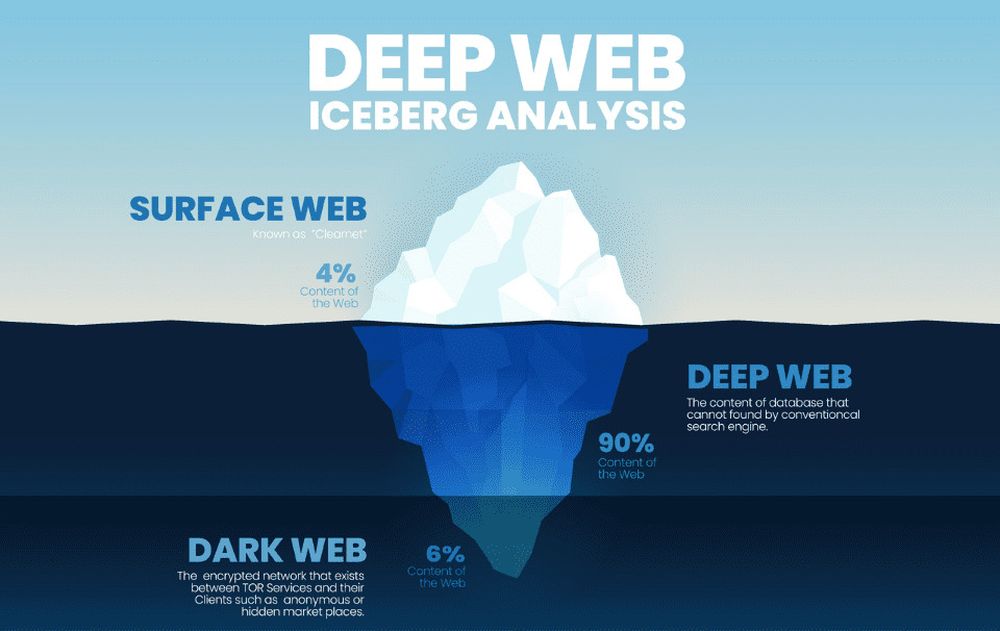Are you curious about the Deep Web? You’re in the right place! In this post, we will dive into the bowels of the deep web to answer all those doubts that worry, torment, and disturb you about it.
And that’s not all, we will also tell you what you have never been told about the Deep web and we will break the most widespread myths that revolve around the most invisible and hidden internet. But before we start…
DISCLAIMER This article is for informational purposes only. It does not support any use of the Internet that is not lawful and is not intended to encourage or invite anyone to enter the Deep Web but to report on it. If you decide to enter voluntarily, from Techidence we are not responsible for the use you make in/from it, the risks you may assume, and the frauds in which you can be immersed by browsing the deep web irresponsibly. Remember: accessing the Deep Web is at your own risk and discretion.
Now yes, here are 7 questions and answers about the Deep web.
1. What is Deep Web?
The Deep Web is an internet space where you can find all the content of the World Wide Web (WWW) that is not indexed due to different reasons: security, anonymity, privacy, illegality, etc. By “non-indexed content” we mean information and websites that do not appear in conventional search engines such as Google, Yahoo, or Bing, among others, and therefore are not available in the search results pages.
Did You Know At Some Point You Have Used the Deep Web?
No, we are not lying to you. Many legal websites that we access daily belong to the Deep Web. For example, personal logins with username and password of, for example, online banking services, pages containing health information, or files stored in cloud storage services such as Dropbox, Drive, or OneDrive, among others.
Why are they on the Deep Web? Quite simply, they are not indexed in search engines for security reasons, because they are private, blocked, too old, or irrelevant for search engines.
2. Is Deep Web Big As They Say?

The answer is yes. It is estimated that the Deep Web constitutes 96% of the Internet and contains approximately 7.5 petabytes of information (approximately 7,500 terabytes). The remaining 4% corresponds to the part of the Internet that we all know is indexed and is called the Surface web or Clearnet. The Internet is like an iceberg!
3. How to Enter the Deep Web?
A “safe” way to enter the Deep web is through one of the many specific browsers available for surfing the deep web, such as Tor Browser, which ensures anonymous access.
We say safe in quotation marks because, like everything in this life, surfing the deep web is not risk-free, i.e., you will never have 100% security. However, by accessing through Tor and taking certain precautions that we will explain later, you can do so without major problems.
The first thing you have to do is download Tor Browser on a computer from the Tor project website and install it. Once installed on your computer, you can go inside the Deep web.
Note that this browser does not work like Google Chrome or Mozilla Firefox in which you type directly into your search engine what you want to search for and you get different results. No. Here it is necessary to have URLs with a “.onion” extension that would be like the “.com” of the internet we know.
If you don’t know any “.onion” links, you will have to pull from Deep Web page directories like, for example, The Hidden Wiki. If you take a look at the home page of The Hidden Wiki you will see an index of page topics that will give you a pretty good idea of the types of sites found here. If you click on one of these links you will be taken to the web page in question.
Be careful with the pages you visit, even out of mere curiosity, as you might find things you would rather not see or that others don’t want you to see. With this, we do not intend to scare you but to warn you and warn you about the Deep Web. And he who warns is not a traitor.
WE ARE NOT RESPONSIBLE FOR THE USE YOU MAKE OF THE DEEP WEB From Techidence we are not responsible for the use you make on the Deep Web or the pages you visit, the content you download, and/or products you buy while browsing.
The Hidden Wiki is a directory widely used by users because the pages and links contained therein are updated and revised daily because they constantly change the domain. This is essential since browsing Tor requires updated links.
There are other directories of pages and specialized search engines of the Deep Web. Some of them are: Onion.city, Onion.to, Tor search Not Evil, DuckDuckgo, Pastebin, Tor Search, Onion.list, TorLinks, and Ahmia, among many others.
Is It Legal to Use A Browser Such As Tor Browser?
Yes, many people who value their privacy use it to browse the Internet securely and anonymously, thus avoiding advertising, being tracked, or having their data and information sold or given to third-party companies.
4. What Can We Find In Deep Web?

The Deep Web contains everything that you do not want to be visible to the general public. We are talking about:
- Private networks, internal sites, and intranet systems of governments, public institutions, companies, associations, commercial organizations, educational centers, etc.;
- Social networks;
- Blogs and forums;
- Hosting services (web hosting and image storage);
- Mail and messaging services: e-mails, text messages, voice chat;
- Online banking services: banking operations and transactions, accesses;
- Online databases;
- Public records and certificates or library system indexes;
- Paywall pages;
- Password-protected websites with members-only access;
- Pages with timed access such as those for online exams;
- Conspiracy theorist groups;
- Book clubs, fan clubs, video game clubs;
- Singing and karaoke competitions;
- Chess or Backgammon type games with international tournaments;
- Computer and technology training, classes and courses;
- And a popular version of Yahoo Answers is called Hidden Answers, among others.
As you can see, in the Deep web not everything is illicit, dark, strange, and sinister as it seems. However, there is a “beyond” called Dark web where you can find that illegal content that is responsible for the deep web to have the bad reputation it has:
- Market of drugs and other narcotics: marijuana, ecstasy, cocaine, hashish, methamphetamine, ecstasy, etc;
- Stolen and hacked premium accounts from Spotify or Netflix, among other services;
- Counterfeits and replicas of everything you can imagine: luxury goods, banknotes, passports, university student IDs, covid passport, lottery coupons, etc.;
- Poisons;
- Services of spies, investigators, thieves, assassins, and hired killers;
- Hacking services and forums: hackers for hire, hacking all types of devices and accounts, spyware development, among others;
- Buying and selling of weapons, explosives, and ammunition;
- Eroticism and pornography (including child and animal pornography) and other sexual exploitation services;
- State secrets and whistleblowers;
- Countless ebooks and books illegally distributed via direct download;
- Financial services of all kinds: bitcoin laundering, stolen Paypal accounts, cloned credit cards, anonymous money wallets;
- Political activism in the purest House of Cards style: censored file sharing, organization of mass-financed assassinations, hacktivism, etc.
5. What Precautions Should Be Taken When Surfing the Deep Web?

Before and while surfing the Deep Web, it is advisable to take the following precautions, especially if you are a novice in the subject:
Before Surfing the Deep Web:
- Never use your personal computer. If you do -because you have no other choice- leave your PC empty, save all your information and data on another computer or external storage device so that before browsing there is no trace of you. This way, if someone manages to access your computer, there will be nothing to compromise you, nor your personal information that they can use for mischief.
- The use of a VPN is recommended to further hide your identity. Preferably, it should be located in countries with favorable legislation such as Panama or the British Virgin Islands. Avoid by all means using VPN servers located in the United States.
- Always use the latest version of the software for surfing the Deep Web. For example, if you browse through Tor Browser, make sure it is updated to the most recent version of the browser. This makes it less likely that your identity can be discovered or that an attacker will find a vulnerability to attack you.
During Browsing:
- If you are just getting started in browsing the Deep web… do not upload photos, documents, or files as these generate metadata that could reveal your first and last name, the operating system you use, geographic location, and other personal data.
- Try not to download any files from the deep web. If you need to download them, do not open them without first scanning them (for malicious code) and run them without an internet connection.
- Do not provide personal information or sensitive information such as full name, email address, address, place of study, marital status, among others, in any form, forum, or chat. Also, do not give your real name, always use a pseudonym.
- Although it is obvious, do not use the Deep web to connect to your social networks, email, usual marketplace such as Amazon or eBay or your bank, among other services where you have to log in.
- Do not browse local websites, for example, the website of your local council, so as not to give clues to potential attackers of the location where you are. If you have to search, avoid using Google as much as possible (if you do, always use the domain Google.com instead of Google.es, Google.fr depending on your location) and use other privacy-friendly search engines such as Duckduckgo or Startpage.
- Do not use the same username and password for forums, online stores, and email services that require a username and password.
- Never accept two-step verification processes. By entering your cell phone number you are already revealing your identity and location.
- Do not surf the Deep web and the Surface web simultaneously, as you run the risk of confusing your browser and very foolishly end up revealing your information and identity to third parties.
- If you are surfing the Deep web and have to leave for a few minutes, do not leave your computer unattended. Log out or lock your computer to prevent third parties from using your PC and revealing your identity, connecting to their social networks, giving personal data to a stranger, etc.
- Restart your browser periodically. If you use Tor Browser, closing the browser will delete stored cookies, so don’t be afraid to close and open the browser from time to time to stay safe.
6. Can I Go To Jail For Surfing Deep Web?
It depends. What does it depend on? Obviously, on the use, you make of the Deep Web.
If you enter the Deep web to satisfy your thirst for curiosity, that is, to have a look around, take a walk and not do or buy anything you shouldn’t -I think everyone knows what is legal and what is not in their country- nothing will happen to you. You can rest assured, you won’t end up in a jail cell.
Now if you enter the Deep web looking for fresh drugs, the services of a hitman or hired thug to beat up your brother-in-law, hire a hacker to hack your girlfriend’s cell phone, or consume child pornography, among other illicit acts, you will be committing a crime and you could be arrested and tried for it.
TECHIDENCE DOES NOT SUPPORT ANY USE OF THE INTERNET THAT IS NOT LEGAL AND/OR LAWFUL.
7. What Are the Dangers of the Deep Web?

Being unregulated and completely free, everything happens on the Deep Web, even what you least expect. It’s a lawless place! Many are the dangers lurking in the deep web. Here are some of them:
- Hackers and hackers abound on the Deep web. They are waiting for the unwary to slip in where they shouldn’t, fill out a suspicious contact form with their data, or download a file with malicious software inside to access and/or steal your personal information and do anything but good things with it.
- And criminals of all kinds are also proliferating: contacting and communicating directly with these kinds of people can be very dangerous as they can put your own and your loved ones’ integrity at risk through threats, blackmail, extortion…
- Being able to buy and acquire everything -everything is everything- frauds and scams are the order of the day. And what could happen to you? That you buy something and it never arrives or that they make you pay with a credit card and days later the charge appears in your account but multiplied by 10.
Yes, we know that these scams also occur on the Internet that we usually surf, but in the Deep Web, the legal and the illegal coexist, sometimes there is no possibility to complain, open a dispute with the merchant or online store, let alone report it directly to the police.
- Governments around the world and global intelligence, security, and investigation institutions such as the FBI, -yes, the FBI itself- are constantly monitoring the Deep Web in search of not only criminals but also people like you and me who can in an oversight commit an illegal act in the deep web. Be very careful with the information you consume and what you buy and/or hire!
- Much of the content found on the Deep Web can disturb and shock us so much that it could become detrimental to our emotional and mental health. Watching them could, in addition, affect our personal and family environment.
We hope this post has solved all your doubts about the Deep Web. If you decide to enter it, do it safely without exposing your personal information and using it only for lawful and ethical purposes.
This post may contain affiliate links, which means that I may receive a commission if you make a purchase using these links. As an Amazon Associate, I earn from qualifying purchases.

